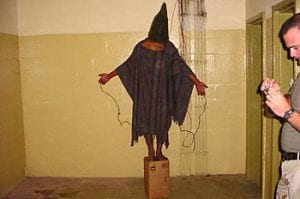After deliberating for eight days, jurors announced that they had been unable to react a verdict due, in part, to disagreement over whether the U.S. Army or a private company controlled civilian “interrogation” contractors.
A judge has declared a mistrial after jurors announced that they were unable to reach a verdict in a lawsuit filed by three men, all of whom claim they were tortured by U.S. Army soldiers and civilian interrogators in Abu Ghraib.
According to The Associated Press, the eight-member civil jury spent eight days in deliberation.
Although the jurors spent longer in deliberation than they did in trial, they could not reach a consensus on whether civilian interrogators contracted by the U.S. Army had conspired with soldiers to “soften up” detainees at the notorious Abu Ghraib prison in Iraq.
The contractor, CACI, had argued that it was not complicit in detainees’ abuse, and maintains that its employees had little interaction with the three individual plaintiffs. Any liability for abuse or mistreatment, CACI said, should instead be attributed to the government.
The Associated Press notes that, while jurors have since indicated that a “majority” sided with the plaintiffs, there appears to have been disagreement over CACI’s invocation of the “borrowed servants” doctrine. Under most interpretations of borrowed servants doctrine, a company cannot be held liable for certain types of its claims if its employees were, per the terms of a contract or other agreement, acting at the behest of another organization.

Borrowed servants doctrine is most often employed in workers’ compensation claims. However, CACI attorneys suggested that its civilian interrogators necessarily acted under the control and direction of the U.S. Army—an argument that the plaintiffs’ own legal team had tried to keep out of the courtroom, but which Judge Leonie Brinkema allowed the jury to hear and consider.
Before the jurors were left to deliberate, they were told that—if CACI could prove that its interrogators were acting at the behest of the U.S. Army during the period of alleged abuse—then the jury should largely absolve CACI of any civil liability.
Since the implications of borrowed servants doctrine was expected to play a critical role in the case’s outcome, much of the trial revolved around issues of employee control, discretion, and supervision. Attorneys for the plaintiffs, for instance, said that CACI’s contract with the Army required that CACI supervise its own employees at all times. They similarly cited a section of the Army Field Manual stating that “only contracts may supervise and give directions to their employees.”
This Field Manual excerpt, adds The Associated Press, contributed to the jury’s inability to reach a verdict.
The lawyers who represented the three plaintiffs—all men who were detained and allegedly subjected to physical, mental, and sexual abuse at Abu Ghraib—have said that, despite the mistrial, “the current expectation is that we’ll continue to fight.”
“The work that we put in to this case is a fraction of what [the plaintiffs] endured as survivors of the horrors of Abu Ghraib, and we want to honor their courage,” said Center for Constitutional Rights attorney Baher Azmy.
The New York Times notes that, during the trial, jurors heard testimony from each of the plaintiffs: one of whom, Salah Al-Ejaili, said that interrogators kept him shackled in a “painful stress position” overnight before ordering him to clean up his own vomit in the morning.
Another plaintiff, Asa’ad Al-Zuba’e, said that interrogators placed a bag over his head before forcing him to crawl down a hallway until his legs bled. And the third, Suhail Al Shimari, said that he was repeatedly threatened with rape and execution.
“I had no control over what was happening to me, or what would happen to me,” Al-Ejaili told the jury.
The Times observes that, while photographs of abuse at Abu Ghraib made national headlines after being released in April 2024, fewer than a dozen enlisted soldiers were successfully court-martialed and convicted.
“Everyone knew it was wrong,” said Charles A. Graner, one of the convicted soldiers. “And no one was willing to step up and stop it.”
Sources
Judge declares mistrial after jury deadlocks in lawsuit filed by former Abu Ghraib prisoners
Jury in Federal Lawsuit Deadlocks on Abu Ghraib Torture Allegations


Join the conversation!